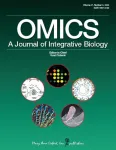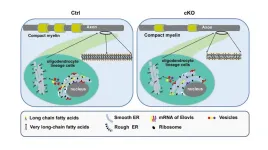(Press-News.org) The community of microbes living in and on our bodies may be acting as a reservoir for antibiotic resistance, according to new research from the Earlham Institute and Quadram Institute in Norwich.
The use of antibiotics leads to ‘collateral damage’ to the microbiome, ramping0 up the number of resistance genes being passed back and forth between strains in the microbiome.
The findings also suggest these genes spread so easily through a population that, regardless of your own health and habits, the number of resistance genes in your gut is heavily influenced by national trends in antibiotic consumption.
The rise of antimicrobial resistance (AMR) among human pathogens is widely seen as one of the most serious threats to global health in the coming decades. AMR is already believed to be contributing to tens of thousands of deaths in Europe each year.
Tracking the emergence and spread of genes that help these pathogens to shrug off antibiotics has generally been limited to samples taken from infected individuals. The majority of microbes living in the human body, however, are not pathogenic.
The human microbiome is a complex and dynamic community of millions of species of microbes, primarily living in the gut and coexisting with us. Microbiomes play an important role in health and disease, with the gut microbiome known to help with the digestion of food and the development of our immune system.
Professor Chris Quince, author of the research at the Earlham Institute and Quadram Institute, said: “Even a healthy individual, who hasn’t taken antibiotics recently, is constantly bombarded by microbes from people or even pets they interact with, which leads to resistance genes becoming embedded in their own microbiota.
“If they exist in a population with a heavy burden of antibiotic consumption, it leads to more resistance genes in their microbiome.”
To better understand the impact of antimicrobials on the gut microbiome, researchers at the Earlham Institute and Quadram Institute in Norwich, together with collaborators in the Republic of Korea, analysed over 3,000 gut microbiome samples, collected from healthy individuals across 14 countries.
They then compared the resistance genes identified in samples to those found in large genome collections in order to understand the movement of AMR genes between microbe and pathogen species.
“We deliberately focussed on samples from healthy people, or at least those we could be confident weren’t taking antibiotics,” explained Professor Quince. “We needed to see the gene profile in the gut microbiome without the influence of any antimicrobials.”
They carefully catalogued and recorded the number of antimicrobial resistance genes found in the samples by comparing data to the Comprehensive Antibiotic Resistance Database, a public health resource where resistance genes are documented.
The team identified a median of 16 AMR genes per stool sample analysed. They also found the median number of genes varied across the 14 countries for which they had data.
For example, they saw a five-fold variation in median resistance levels between the lowest in the Netherlands and the highest in Spain.
Using World Health Organization and ResistanceMap data, the team were able to show a strong correlation between the frequency of resistance genes present in a country and national antibiotic consumption levels.
“We found that, in countries where antibiotics are taken more regularly, their populations also have higher numbers of resistance genes in their gut microbiome,” said Professor Quince.
The reason this collateral damage is such a major problem is that microbes are constantly sharing genes with each other. Known as horizontal gene transfer, this process helps AMR genes to spread back and forth between species.
“Our bodies are continually importing and exporting microbes and pathogen strains,” explained Professor Quince. “These strains are themselves passing genes back and forth, which means the challenge of AMR has to be tackled at both the micro and macro level.
“Given our complex relationship with microbes, we need to do more research to understand how we maximise the benefits and minimise the risks when it comes to guiding treatment decisions and developing new medicines.”
Professor Falk Hildebrand, research author at the Quadram Institute and Earlham Institute, said: “We’ve known for some years that antimicrobial resistance genes can spread incredibly fast between gut bacteria.
“This study is so important because it can, for the first time, quantify the impact national antibiotic usage has on our commensal bacteria, as well as giving us insights into the common types of resistance we can expect to evolve.”
The researchers plan to carry out further research - and encourage others to - in order to investigate the relationship in more countries and inform public health strategies.
The research was funded by UKRI-Biotechnology and Biological Sciences Research Council, UKRI-Natural Environment Research Council, and the European Research Council.
ENDS
For media enquiries, please contact Greg Bowker at the Earlham Institute on 01603 450 895 or 07792 154497, or by emailing Greg.Bowker@earlham.ac.uk.
Notes to editor
Population-level impacts of antibiotic usage on the human gut microbiome is published in Nature Communications, DOI: 10.1038/s41467-023-36633-7
Samples studied came from Austria, Canada, China, Germany, Denmark, Spain, France, Israel, Italy, Kazakhstan, Madagascar, Netherlands, Sweden, and the USA.
About the Earlham Institute
The Earlham Institute is a hub of life science research, training, and innovation focused on understanding the natural world through the lens of genomics. Embracing the full breadth of life on Earth, our scientists specialise in developing and testing the latest tools and approaches needed to decode living systems and make predictions about biology.
The Earlham Institute is based within the Norwich Research Park and is one of eight institutes that receive strategic funding from UKRI Biotechnology and Biological Science Research Council (BBSRC), as well as support from other research funders.
earlham.ac.uk
END
URBANA, Ill. – In today’s pet food market, there are products to match nearly every lifestyle, value system, and price point pet owners demand, including vegan formulations. New University of Illinois research shows at least two human-grade, lightly cooked vegan diets provide adequate nutrition for dogs.
“The trends of vegan foods and human grade foods are increasing for dogs. Because people are feeding these diets to their pets, it’s important they be tested like all other foods to make sure they're safe and ‘complete and balanced,’” ...
A new study published in the peer-reviewed OMICS: A Journal of Integrative Biology identified differentially expressed host and viral microRNAs (miRNAs) in six Epstein-Barr virus (EBV) associated tumors. The study reports several drug candidates for repurposing and targeting EBV latent infection: Glyburide, Levodopa, Nateglinide, and Stiripentol, among others. Click here to read the article now.
The authors, Anamika Thakur and Manoj Kumar, PhD, from the Institute of Microbial Technology, Council of Scientific and Industrial Research (CSIR), Chandigarh, India, note: “This is the first integrative analysis, to the best of our knowledge, in regard to the potential ...
ORLANDO, March 27, 2023 - A University of Central Florida professor and 26 other researchers have published a study identifying the challenges humans must overcome to ensure that artificial intelligence is reliable, safe, trustworthy and compatible with human values.
The study, “Six Human-Centered Artificial Intelligence Grand Challenges,” was published in the International Journal of Human-Computer Interaction.
Ozlem Garibay ’01MS ’08PhD, an assistant professor in UCF’s Department ...
More than half amount in adult human brain is made up of white matter. Lipid-rich myelin is a special structure formed by oligodendrocytes wrapping neuronal axons to form the major components of white matter. Abnormal myelin sheath is associated with many neurological diseases. Mea6/ cTAGE5C is essential for vesicle trafficking from ER to Golgi. However, its biological function in oligodendrocyte and white matter development remains unclear.
Scientists from Institute of Genetics and Developmental Biology of Chinese Academy of Sciences generated mice with conditional knockout (cKO) of Mea6 in oligodendrocytes. Using ...
Recently, a research group lead by Prof. Shuting Wang from topology optimization of Huazhong University of Science and Technology has put forward a massively efficient filter utilizing the splitting of the tensor product structure. This study can be found in the journal Frontiers of Mechanical Engineering on 10 January, 2023.
With the aid of spitting technique, the traditional weight matrices of both B-splines and non-uniform rational B-splines implicit filters are equivalently decomposed into two or three submatrices, by which the sensitivity analysis is reformulated for the nodal design variables without altering ...
A large observational study published in JAMA Internal Medicine suggests that most patients do not medically benefit from consultation with a medical specialist before their surgery.
In Canada, surgeons refer more than 40,000 patients each year for consultation with a medical specialist (such as a general internist, cardiologist, endocrinologist, geriatrician, or nephrologist) before surgery. Between 10 and 40% of elective surgery patients will have a preoperative medical consultation.
These preoperative medical consultations are meant to address health issues that could lead to complications during surgery, but the evidence to support them has been limited ...
Public health experts at the University of Colorado Anschutz Medical Campus released a new research letter today in JAMA Pediatrics that examines how quickly Colorado’s children and teenagers can access a loaded gun and call attention to the critical importance of reducing access to guns when an adolescent is in crisis.
“There’s a high rate of firearm suicides in our youth and we know that for a large portion of those who attempt suicide, that ideation to action can happen under 10 minutes,” said principal investigator Ashley Brooks-Russell, ...
After a child’s hospital stay, many families covered by private insurance may experience sticker shock – on average spending $1,300 out of pocket – a new study in JAMA Pediatrics suggests.
For one in seven families, the price tag is even higher, exceeding $3,000.
“Bills for a child’s hospitalization can be astonishingly high for some families depending on how their insurance plan is structured,” said lead author Erin Carlton, M.D., a pediatric intensivist at University of Michigan Health C.S. Mott Children's ...
About The Study: In this study of 1,678 participants, expectations of low benefit and high adverse effects, the tendency to catastrophize instead of normalize benign bodily sensations, and prior negative experiences were associated with COVID-19 vaccination adverse effects. Clinician-patient interactions and public vaccine campaigns may both benefit from these insights by optimizing and contextualizing information provided about COVID-19 vaccines.
Authors: Ingmar Schafer, Ph.D., of the University Medical Center Hamburg-Eppendorf ...
Lunar surface water has attracted much attention due to its potential for in-situ resource utilization by future lunar exploration missions and other space missions
Now, a research group led by Prof. HU Sen from the Institute of Geology and Geophysics (IGG) of the Chinese Academy of Sciences (CAS) has found that impact glass beads in Chang'e-5 (CE5) lunar soils contain some water.
Detailed studies show that these glass beads are likely a new water reservoir on the Moon, recording the dynamic ingress and egress of solar wind-derived water and acting ...




